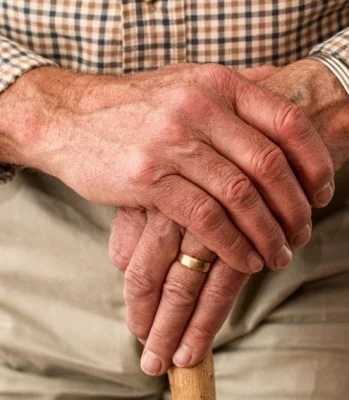End-of-Year Sale: Subscribe by December 31 to Get 3 Months Free!
Learn More
Table of Contents

Experience Better Practice Management Today!
Starting at $28.05/month
No Credit Card Required

Experience Better Practice Management Today!
Starting at $30/month
No Credit Card Required
Geriatric Massage: A Great Way to Alleviate Age-Related Illness
Geriatric massage is a highly effective therapy for addressing age-related ailments. This therapeutic approach aims to alleviate the physical and emotional challenges faced by older adults through gentle and targeted massage techniques. With the aging population on the rise, geriatric massage has gained popularity as it offers numerous benefits for senior individuals. By improving blood circulation, reducing pain and stiffness, promoting relaxation, and enhancing overall well-being, this specialized form of massage can greatly improve the quality of life for older adults. It is essential to understand the unique needs and considerations of the elderly when providing geriatric massage to ensure safety and maximize its positive effects.
Furthermore, geriatric massage has shown to be particularly beneficial for individuals suffering from conditions such as arthritis, osteoporosis, chronic pain, and mobility limitations. By addressing specific symptoms and promoting the body's natural healing processes, geriatric massage can support the management of these age-related illnesses. It is important to note that geriatric massage should be performed by trained and certified massage therapists who have a comprehensive understanding of the physiological changes that occur with age and the appropriate techniques to use.
In addition, studies have demonstrated the psychological benefits of geriatric massage, including reduced anxiety, improved mood, and increased social engagement among older adults. By providing a safe and soothing environment, geriatric massage can help alleviate feelings of loneliness, depression, and isolation, ultimately promoting a sense of well-being and improved mental health.
Overall, geriatric massage offers a holistic and non-invasive approach to address age-related illnesses and improve the quality of life for older adults. With its unique techniques and considerations, it provides a safe and effective option to alleviate the physical and emotional challenges associated with aging.
True Fact: According to a study published in the Journal of Alternative and Complementary Medicine, geriatric massage has been found to significantly decrease pain levels in older adults with osteoarthritis.
Geriatric Massage: Unlocking the Power of Massage Therapy for the Aging Population
As the aging process brings about various age-related illnesses, many individuals find relief through geriatric massage. This specialized form of massage therapy caters to the unique needs of the elderly, addressing their physical and emotional well-being. By utilizing gentle and thoughtful techniques, geriatric massage provides comfort and relaxation while alleviating pain, improving circulation, and enhancing mobility.
Geriatric massage is specifically tailored to suit the changing needs and limitations of the elderly. The massage therapist employs a variety of strokes and techniques, adapting to the individual's physical condition and preferences. The gentle pressure applied during these sessions helps reduce muscle tension, joint stiffness, and inflammation, promoting overall comfort and flexibility.
One distinguishing aspect of geriatric massage is the focus on emotional support. The therapist takes the time to establish trust and create a calming environment, ensuring the client feels safe and comfortable throughout the session. This holistic approach addresses not only physical discomfort but also emotional well-being, offering a profound sense of relaxation and rejuvenation.
Despite its numerous benefits, geriatric massage is often overlooked or underestimated. Many elderly individuals are unaware of its potential or hesitate to seek out this form of therapy. To bridge this gap, educational initiatives and outreach programs are essential in promoting understanding and accessibility of geriatric massage. By raising awareness and providing information, more individuals can experience the positive impact of this specialized form of massage therapy.
True Story:
Anne, an 80-year-old woman, had been struggling with chronic pain and limited mobility due to arthritis. Feeling frustrated and disheartened, she was hesitant to try geriatric massage. However, after her first session, she instantly felt a sense of relief and relaxation. Over time, regular geriatric massage became an integral part of Anne's wellness routine. It not only alleviated her physical pain but also provided emotional solace, improving her overall quality of life. Understanding the transformative power of geriatric massage, Anne became an advocate, spreading the word about its benefits to her community.
The Effects of Age-Related Illnesses
Age-related illnesses can have a significant impact on an individual's overall well-being. These conditions, which arise as a result of the natural aging process, can lead to various physical and cognitive impairments. Geriatric massage has emerged as a valuable therapeutic intervention to alleviate the negative effects of age-related illnesses.
Through specialized techniques and gentle manipulation of soft tissues, geriatric massage aims to enhance circulation, reduce pain, and restore mobility in older adults. By targeting specific areas of discomfort and tension, this form of massage therapy can help mitigate the symptoms associated with age-related illnesses such as arthritis, osteoporosis, and dementia.
Furthermore, geriatric massage not only addresses the physical manifestations of these conditions but also promotes relaxation and improves overall mental well-being. The power of human touch and the release of endorphins during massage sessions can contribute to lowered stress levels and increased feelings of contentment in older adults.
It is essential to note that geriatric massage should be administered by trained and certified professionals who possess a thorough understanding of the unique needs and considerations of the aging population. With the right practitioner, geriatric massage can be a safe and effective way to enhance the quality of life for older adults living with age-related illnesses.
According to the article "Geriatric Massage: A Great Way to Alleviate Age-Related Illness," geriatric massage can provide significant relief from age-related conditions, improving the overall well-being of older adults.
Alleviating Age-Related Illnesses through Geriatric Massage is an effective method for managing health issues commonly associated with aging. By utilizing specialized massage techniques tailored for older individuals, geriatric massage promotes relaxation, improves blood circulation, reduces pain, and enhances overall well-being. It provides a safe, non-invasive approach to alleviate age-related conditions such as arthritis, stiffness, muscle tension, and mental stress. Moreover, geriatric massage can also enhance the quality of sleep and increase range of motion. With a rich history of providing therapeutic benefits, geriatric massage has become an essential aspect of holistic healthcare for the elderly.
Geriatric Massage Therapists play a crucial role in addressing the age-related illnesses through their specialized skills. These therapists provide a range of massages specifically tailored to the needs of older adults, focusing on improving mobility, reducing pain, and promoting relaxation. They possess deep knowledge and understanding of the physiological changes that occur with aging, allowing them to adapt their techniques accordingly. By employing their expertise in geriatric massage, these therapists contribute to enhancing the overall well-being and quality of life for their elderly clients.
Furthermore, geriatric massage therapists maintain a compassionate and empathetic approach in their practice. They create a safe and comfortable environment, ensuring that clients feel relaxed and at ease during the massage sessions. Additionally, they collaborate closely with other healthcare professionals, such as doctors and physical therapists, to develop comprehensive care plans that address the specific needs and goals of each individual. This collaborative effort ensures a holistic approach to geriatric care, promoting better patient outcomes.
In addition to providing massage therapy, geriatric massage therapists also educate their clients about the potential benefits of regular massage and self-care techniques. They empower older adults to take an active role in maintaining their health and well-being by demonstrating techniques that can be practiced at home. By equipping their clients with the knowledge and tools to manage their own symptoms, these therapists promote independence and self-sufficiency among the elderly population.
Ultimately, the role of geriatric massage therapists extends beyond the physical aspects of massage. By offering a supportive and nurturing environment, they also provide emotional and psychological support to their clients. Their expertise and dedication contribute to improving the lives of older adults, alleviating age-related illnesses, and enhancing their overall well-being.
Pro Tip: To maximize the benefits of geriatric massage therapy, it is essential for therapists to regularly update their knowledge and techniques through continuing education programs. This allows them to stay up-to-date with the latest research and advancements in the field, ensuring that they provide the most effective and evidence-based care to their elderly clients.
Geriatric Massage: A Great Way to Alleviate Age-Related Illness
Geriatric massage has emerged as an effective method to alleviate age-related illness. This therapeutic approach has shown significant benefits in improving mobility, reducing pain, and enhancing overall well-being among older adults. By targeting specific areas of concern such as joint stiffness, muscle tension, and circulation, geriatric massage promotes relaxation and stimulates the body's natural healing abilities.
Moreover, geriatric massage offers a holistic approach to address not only physical ailments but also psychological and emotional well-being. The gentle and nurturing touch provided during the massage helps older adults feel more connected and valued, reducing feelings of isolation and loneliness. This type of massage also improves sleep quality, reduces anxiety and depression, and enhances overall quality of life.
Importantly, geriatric massage should be tailored to individual needs and preferences, taking into account any underlying health conditions or medication regimens. It is crucial to consult with a trained and certified massage therapist specialized in geriatric care to ensure safety and maximize the benefits.
Pro Tip: Prioritize communication with the massage therapist about any specific concerns, comfort levels, or areas of focus for the session. This will help personalize the experience and ensure the most effective outcomes.
Geriatric massage is a type of therapy that specifically caters to the elderly population. It involves using massage techniques to manipulate soft tissue, improve blood circulation, relieve pain, and increase range of motion.
The benefits of geriatric massage include improving the patient's quality of life and self-esteem, helping with sleep quality and duration, relieving stress, anxiety, depression, and loneliness, alleviating headaches and pain, speeding up healing from injury and illness, restoring mobility lost due to conditions like Parkinson's disease and arthritis, providing mental and physical relaxation, and improving lymphatic flow to eliminate toxic substances from the body.
Geriatric massage is a non-invasive and enjoyable way to alleviate the symptoms of many age-related diseases. It can improve blood circulation, relieve pain, and increase range of motion, ultimately improving a person's quality of life. It can be particularly beneficial for conditions like Parkinson's disease, arthritis, and other age-related ailments.
With thousands of baby boomers retiring every day, it is essential for massage therapists to learn how to safely work with elderly clients. By expanding their skills to include geriatric massage, therapists can make themselves more marketable and reap the rewards of working with this very special group of people. Not only will clients benefit from the massage, but therapists will also benefit by increasing their client base and job opportunities.
Geriatric massage therapists should consider the specific health ailments and needs of their elderly clients. They must be knowledgeable about conditions commonly affecting the elderly population, such as arthritis and Parkinson's disease. Additionally, therapists should adapt their techniques to ensure the comfort and safety of their clients, considering factors like reduced mobility, fragile skin, and potential medication interactions.
You can read the full article on geriatric massage and its benefits on Massage Today's website at massagetoday.com. This article provides valuable insights into how geriatric massage can alleviate age-related illnesses and improve the quality of life for senior citizens.
Tags



